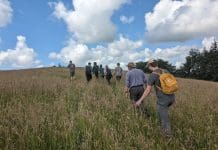How can we use city data to create urban wellbeing? Tom Leaver of Future Cities Catapult takes a look
It should surely come as no surprise to anyone that our cities are expanding, and in many cases at an almost exponential rate of growth. Their constant (and also expanding) needs – particularly in areas such as housing and construction, health and social care, breathability and sustainability, mobility and transport – create incredibly complex ecosystems of intertwined logistics and concerns that would be challenging enough to manage even at their current scale.
Already home to 55% of the world’s population and generators of 80% of global GDP, cities are, even now, almost too big to fully comprehend. Overcrowding and over-pollution are already headline topics and the need to find solutions to these (as well as countless other) issues will only become more urgent as we move into the future.
Cities of hope
As daunting as all these challenges may seem, here at Future Cities Catapult we firmly believe they are much more than a problem to solve. We think that they could be our greatest hope.
How so?
Well, they have a lot of things going for them. They are very efficient in terms of population density. Many more of us can live on the same acreage in a city than we could in rural areas. It’s much easier to do more on foot in a city. Public transport is a much more practical primary means of transport in a city than it is out of town.
If we could run our cities effectively and efficiently, could they not in fact become hotbeds of wellbeing?
And not just for their citizens, but also for the world as a whole? With our increasing population and a finite amount of land upon which to live our lives, do cities not, in fact, make perfect sense?
Perhaps – if they can be run with wellbeing as a core function as opposed to just an afterthought – they can. But where do we start?
Data Science Fellowships
We think the sensible place to start is with the information cities already hold in their systems. Local authorities generate, host and use large amounts of data through their day-to-day operations. However, despite the opportunities for leveraging that data, local authorities rarely have access to the budget or skills necessary to fund data-driven innovations.
Which is why the Data Science Fellowships were set up: to help them develop greater confidence in working with data innovators and create new market opportunities for innovative UK companies. And in so doing, city councils are now starting to unlock and make better use of their data, which is key to solving city challenges – poor air quality and housing conditions to name just two – to create a better urban environment for all.
Data-driven wellbeing in practice
In Newcastle upon Tyne, Data Science Fellow Dr Raquel Vaz worked on a data challenge concerning air quality. Working in collaboration with the city council and Newcastle University’s Urban Observatory, the aim was to determine the impact of restricting vehicle access on a key city centre link, Blackett Street.
Using time series analysis and geospatial statistics, Dr Vaz demonstrated that temporary road closures significantly improve air quality in the centre of Newcastle during selected weekends. What’s more, she created a roadmap for potential future analysis and data sharing, which could lead to systematic improvements in air quality over the longer term.
And in Nottingham, where ensuring private rental housing is in good condition for tenants is a very real challenge, Data Science Fellow Dr David Hopkinson worked with the city council to look at the council’s landlord licensing scheme.
Using a machine learning approach known as Active Learning, Dr Hopkinson and the Geographical Information Systems team in Nottingham were able to combine data science and expert domain knowledge to identify private rental properties that were unlikely to be registered with the licensing scheme but needed to be.
The information generated quickly helped identify homes that were considered most vulnerable. Early estimates suggest that by taking this approach, the council’s Safer Housing team could identify up to six times more unregistered rental properties over a two-year period.
 The wellbeing of our future and the future of wellbeing
The wellbeing of our future and the future of wellbeing
These benefits are just the tip of the iceberg. As well as the social and environmental benefits illustrated here, just imagine how cities working confidently with their data might also create new market opportunities. These commercial data science services in local authorities, combined authorities and cities could save money, create efficiencies in processes, lead to a better service and generally create economic and social good.
Working in more data-driven and efficient ways can help local authorities meet the growing demands of cities and their citizens. In the coming years, we hope to grow the number of fellowships per programme, and partner with innovative UK SMEs and large businesses to help local authorities identify and provide solutions to any number of specific challenges.
And in so doing, we hope we can help cities evolve into the cities we need for the wellbeing of our future – and for the future of our wellbeing. If you are a local authority or city council with a unique challenge or one that is common to other councils, Future Cities Catapult can help you access the expertise of a data scientist. To find out more about this programme get in touch.
If you’re a company with an innovation that could help councils unlock their data or use it more effectively, get in touch at ycoleman@futurecities.catapult.uk.
Tom Leaver
City Data Sharing Toolkit Project Manager
Future Cities Catapult
Tel: +44 (0)20 7952 5111
ycoleman@futurecities.catapult.uk
www.futurecities.catapult.org.uk
Twitter: @futurecitiescat
LinkedIn: Future Cities Catapult
YouTube: Future Cities Catapult

















